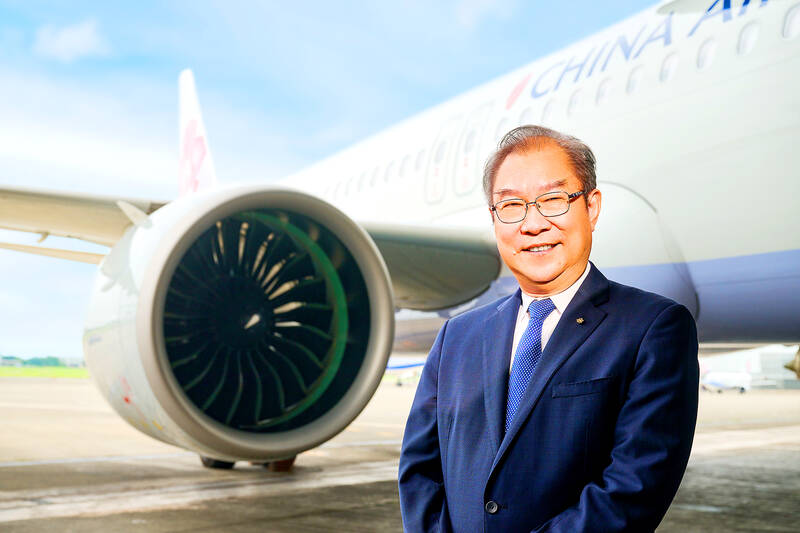China Airlines Ltd (CAL, 中華航空) would prioritize adding direct flights to Prague and Vienna in the second half of next year due to increasing demand, CAL president Kao Shing-hwang (高星潢) said.
During an interview in Hamburg, Germany, Kao said CAL flights to Europe this year have been more than 85 percent full and that 80 percent of seats over the Christmas peak season have been sold.
The airline is now looking to increase the number of flights to the continent, he said.

Photo courtesy of China Airlines Ltd
The goal is to increase the number of flights to Prague from two to five per week and to Vienna from four to six per week in the second half of next year, as CAL aims to have 30 flights to Europe weekly, Kao said.
However, adding more flights depends on when new aircraft are delivered, he said.
CAL is the only airline that operates direct flights from Taipei to Prague.
Since the launch of the flights last year, the occupancy rate has reached 90 percent.
Apart from tourists, the route has also attracted business travelers to nearby cities, including the German cities of Nuremberg and Dresden, Kao said.
Taiwan Semiconductor Manufacturing Co (台積電) broke ground in August on a factory in Dresden.
China Airlines currently flies to six places in Europe from Taiwan: Amsterdam, Frankfurt, Vienna, London, Rome and Prague.
It is the Taiwanese airline with the most destinations and direct flights to Europe.
With a fleet of 82 aircraft and 560 flights per week, CAL’s net profit in the first three quarters of this year reached a record NT$10.37 billion (US$319.4 million), up 50.3 percent from a year earlier.
The company’s full-year profit is expected to remain high due to peak season effects in the fourth quarter, Kao said.
Asked if the company’s year-end bonuses would break the record of being equal to six months of salary, Kao said: “I hope employees will be very satisfied,” without elaborating.

TAKING STOCK: A Taiwanese cookware firm in Vietnam urged customers to assess inventory or place orders early so shipments can reach the US while tariffs are paused Taiwanese businesses in Vietnam are exploring alternatives after the White House imposed a 46 percent import duty on Vietnamese goods, following US President Donald Trump’s announcement of “reciprocal” tariffs on the US’ trading partners. Lo Shih-liang (羅世良), chairman of Brico Industry Co (裕茂工業), a Taiwanese company that manufactures cast iron cookware and stove components in Vietnam, said that more than 40 percent of his business was tied to the US market, describing the constant US policy shifts as an emotional roller coaster. “I work during the day and stay up all night watching the news. I’ve been following US news until 3am

UNCERTAINTY: Innolux activated a stringent supply chain management mechanism, as it did during the COVID-19 pandemic, to ensure optimal inventory levels for customers Flat-panel display makers AUO Corp (友達) and Innolux Corp (群創) yesterday said that about 12 to 20 percent of their display business is at risk of potential US tariffs and that they would relocate production or shipment destinations to mitigate the levies’ effects. US tariffs would have a direct impact of US$200 million on AUO’s revenue, company chairman Paul Peng (彭雙浪) told reporters on the sidelines of the Touch Taiwan trade show in Taipei yesterday. That would make up about 12 percent of the company’s overall revenue. To cope with the tariff uncertainty, AUO plans to allocate its production to manufacturing facilities in

Six years ago, LVMH’s billionaire CEO Bernard Arnault and US President Donald Trump cut the blue ribbon on a factory in rural Texas that would make designer handbags for Louis Vuitton, one of the world’s best-known luxury brands. However, since the high-profile opening, the factory has faced a host of problems limiting production, 11 former Louis Vuitton employees said. The site has consistently ranked among the worst-performing for Louis Vuitton globally, “significantly” underperforming other facilities, said three former Louis Vuitton workers and a senior industry source, who cited internal rankings shared with staff. The plant’s problems — which have not

COLLABORATION: Given Taiwan’s key position in global supply chains, the US firm is discussing strategies with local partners and clients to deal with global uncertainties Advanced Micro Devices Inc (AMD) yesterday said it is meeting with local ecosystem partners, including Taiwan Semiconductor Manufacturing Co (TSMC, 台積電), to discuss strategies, including long-term manufacturing, to navigate uncertainties such as US tariffs, as Taiwan occupies an important position in global supply chains. AMD chief executive officer Lisa Su (蘇姿丰) told reporters that Taiwan is an important part of the chip designer’s ecosystem and she is discussing with partners and customers in Taiwan to forge strong collaborations on different areas during this critical period. AMD has just become the first artificial-intelligence (AI) server chip customer of TSMC to utilize its advanced